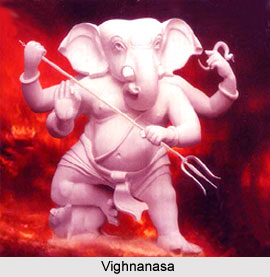 Vighnanasa is the seventh form among the 12 forms of Lord Ganesha. The popular Hindu God is regarded as the remover of all the obstacles and hindrances in this form. The elephant headed deity is the son of Goddess Parvati (Uma Devi) and Mahesha (Lord Shiva). He has a divine mouse, known as Krauncha, as his mount or vahana. Lord Ganesha is considered as one of the 5 supreme gods in Hindu religion. He is worshipped for welfare ceremonial occasions without any obstructions.
Vighnanasa is the seventh form among the 12 forms of Lord Ganesha. The popular Hindu God is regarded as the remover of all the obstacles and hindrances in this form. The elephant headed deity is the son of Goddess Parvati (Uma Devi) and Mahesha (Lord Shiva). He has a divine mouse, known as Krauncha, as his mount or vahana. Lord Ganesha is considered as one of the 5 supreme gods in Hindu religion. He is worshipped for welfare ceremonial occasions without any obstructions.
Vighnanasa, also known as Vighnanash, is the eradicator of all ills and catastrophes. Ganesha, in this form, removes all fears from the minds of His devotees who worship and pray to Him with folded hands. He destroys all evils and manifests before His worshippers in the form of blessings. As the deity possesses ultimate control over all evils and ills, he is known as Vighnanasa or Vighnesh.
This article is a stub. You may enrich it by adding more information to it. You can send your write-up at content@indianetzone.com




















